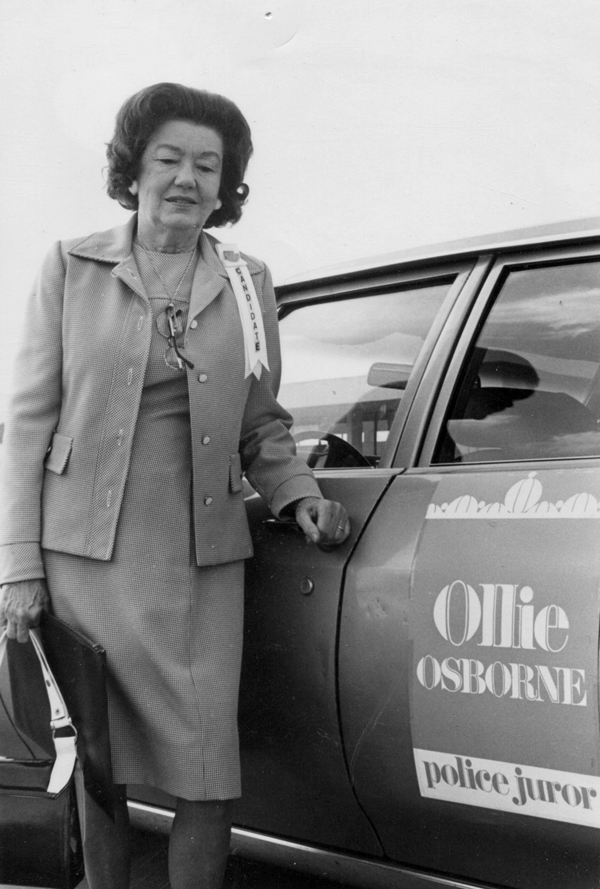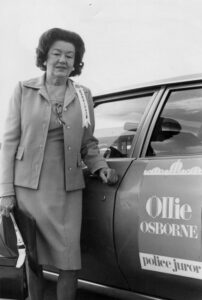Ollie Tucker Osborne
Ollie Tucker Osborne spent thirty years as a businesswoman before becoming active in supporting and promoting the women's movement in Louisiana in the 1970s.

Courtesy of
Ollie Osborne. Unidentified
After a thirty-year career in business, Ollie Tucker Osborne became one of Louisiana’s most active supporters of the women’s rights movement. She served as the official observer of the 1973 state constitutional convention for the Louisiana League of Women Voters. Utilizing her background in business and public relations, Osborne wrote a series of newspaper articles about the convention for readers around the state. Her interest in politics and government stimulated, she campaigned for women’s rights and the passage of the Equal Rights Amendment (ERA) throughout the 1970s.
Born on November 11, 1911, in Ruston, Ollie Tucker was the daughter of Ollie Lee and Ruth Knowles Tucker. Her father was a Methodist minister who served various churches in northern and central Louisiana. She graduated from Whitworth Junior College and attended Louisiana State University. Before graduating, she married Louis Birk and moved to New York City, where she finished her degree at New York University in 1932. For most of the next twenty years, she worked in various aspects of public relations, including in the infant television industry during the late 1940s and early 1950s. After World War II, Louis Birk established Birk and Company, a publisher of educational booklets for business and industrial employee programs.
Following Louis Birk’s sudden death in 1952, Osborne served as editor and publisher of the company until it was dissolved in 1970. She and her three young children moved to Louisiana soon after Birk’s death. In 1955, Ollie married Robert S. Osborne, an English professor at Southwestern Louisiana Institute (now the University of Louisiana at Lafayette).
Osborne’s political activities started in earnest in 1973 when she took a leave of absence from her career in real estate to serve as the Louisiana League of Women Voters’ official observer of the state constitutional convention. The league strongly supported the effort to replace the ponderous and outdated 1921 constitution. At the request of the women’s editor of the Lafayette Daily Advertiser, Osborne began writing a series of articles about the conference. With the backing of the league and financial support from Governor Edwin W. Edwards’s administration, this evolved into a tri-weekly series distributed to smaller papers throughout the state. Osborne’s articles probably contributed to voters’ approval of the new document by familiarizing them with the deliberations and decisions of the convention.
During the convention, Osborne became friends with women who were involved with the growing women’s rights movement in the state. She was particularly supportive of groups who advocated passage of the ERA, serving on the steering committee of ERA United and doing public relations work on its behalf. She also chaired the regional Evangeline area ERA coalition.
In 1975, Osborne became the first woman not the widow of a deceased member to run for the Lafayette Parish Police Jury. Though she finished second in a field of three, she continued to be politically active and encouraged other women to do the same. She helped push the Edwards administration to establish the Governor’s Task Force on Rights and Responsibilities in 1974, leading to the development of a state commission on the status of women. This commission, in turn, created a talent bank of the names of women qualified to work in state government.
Edwin Edwards later appointed Osborne to the coordinating committee for the Louisiana Women’s Conference, the state conference held in conjunction with International Women’s Year in 1977. At this conference, she organized a workshop on women and the law that emphasized the discrimination Louisiana women suffered because its legal system was based on the French Napoleonic code and the “Head and Master” concept. Osborne edited the final report for the conference.
The final defeat of the ERA in 1982, combined with increasing health problems, led to Osborne’s withdrawal from most public activities in the early 1980s. She died in 1994. Her papers are in the University Archives and Acadiana Manuscripts Collection at the University of Louisiana at Lafayette.
